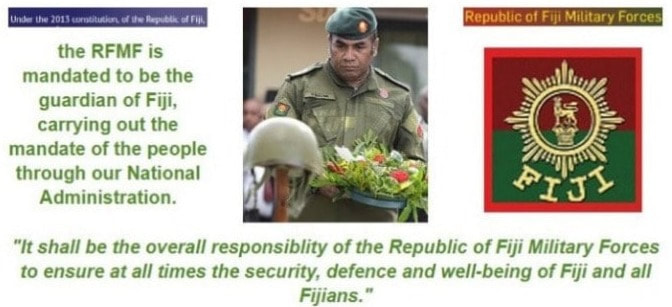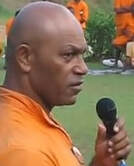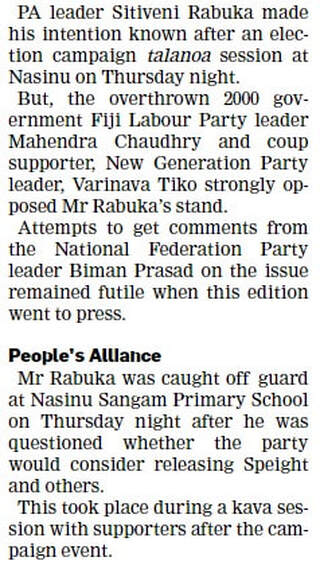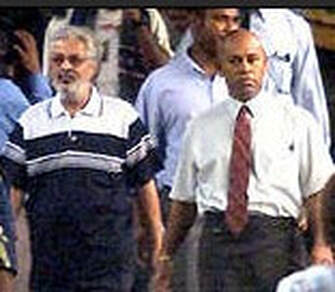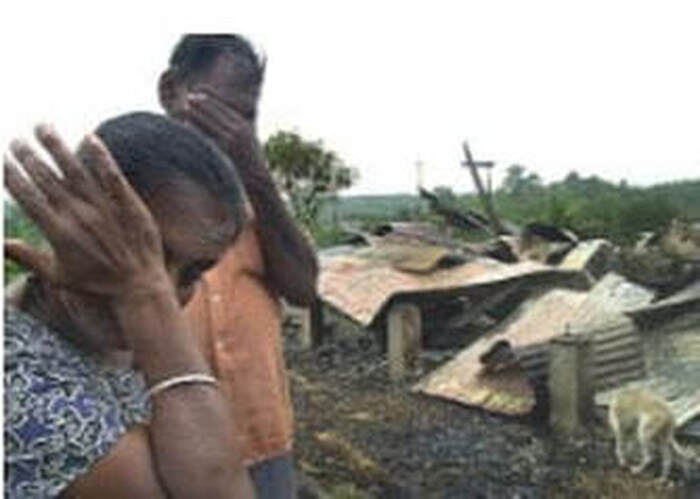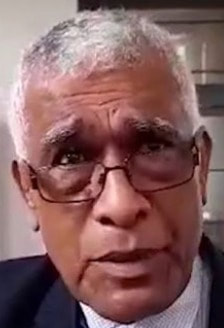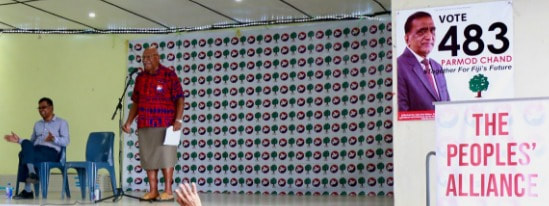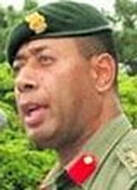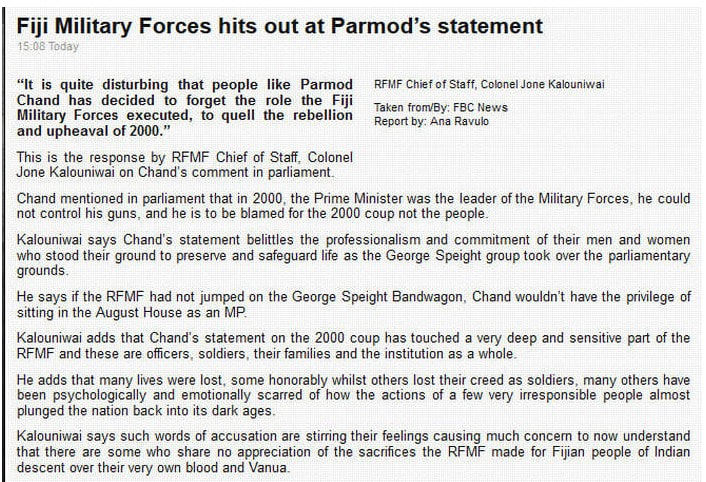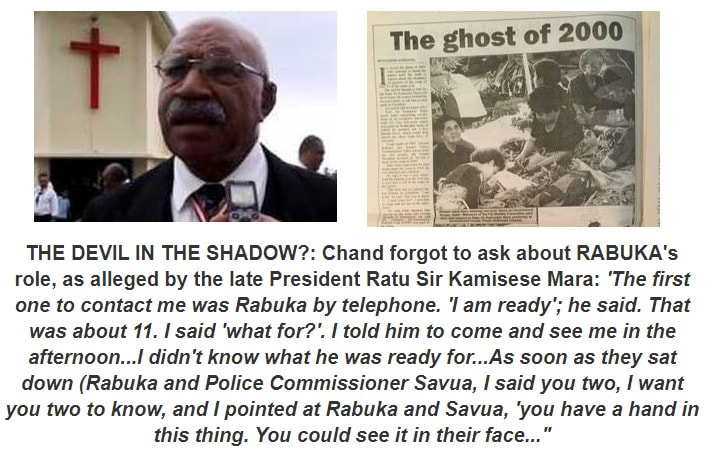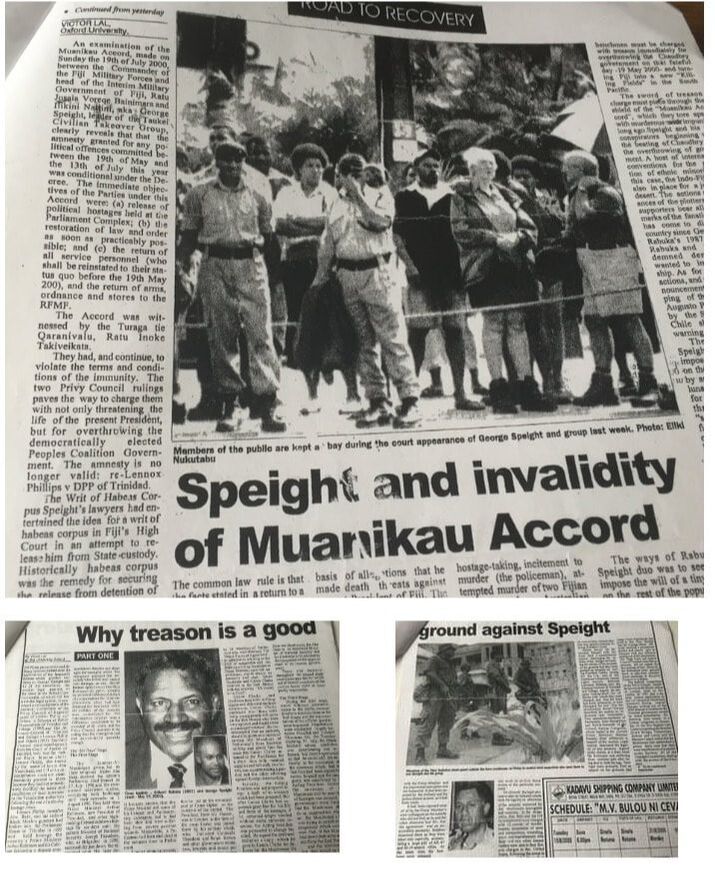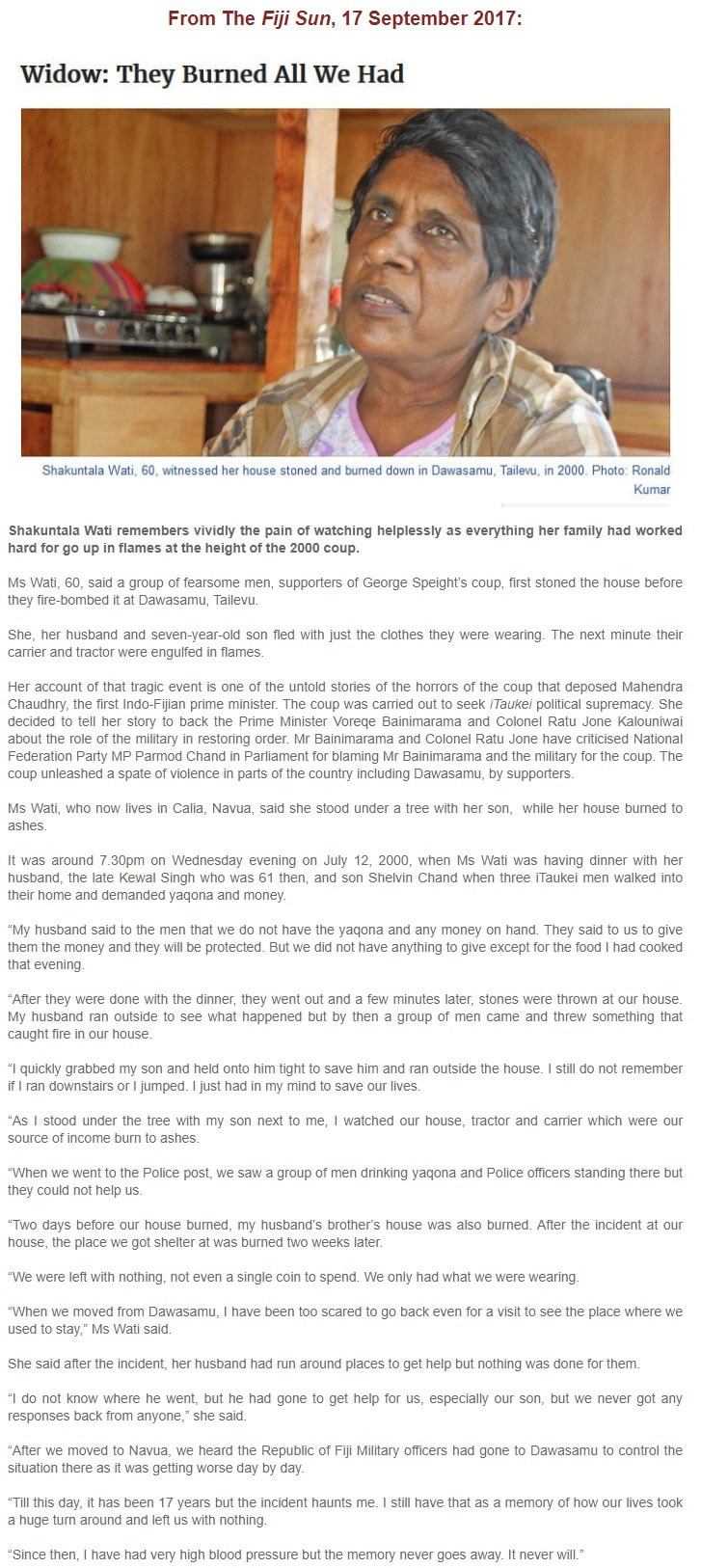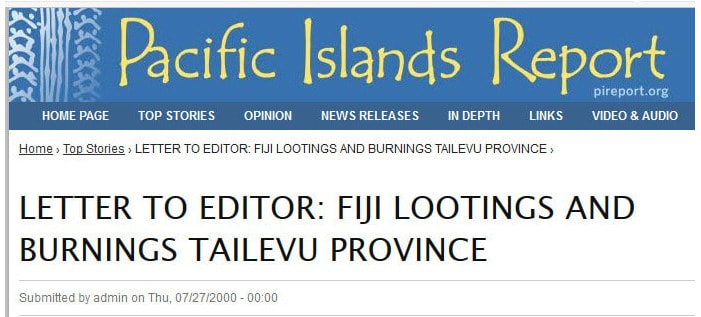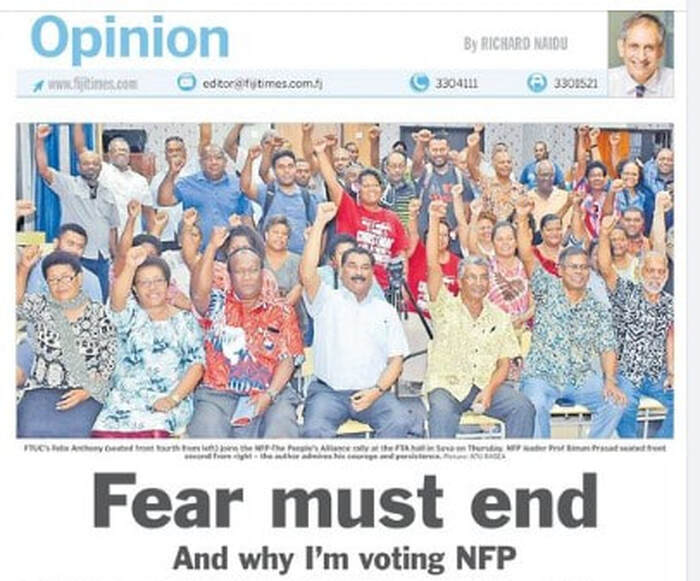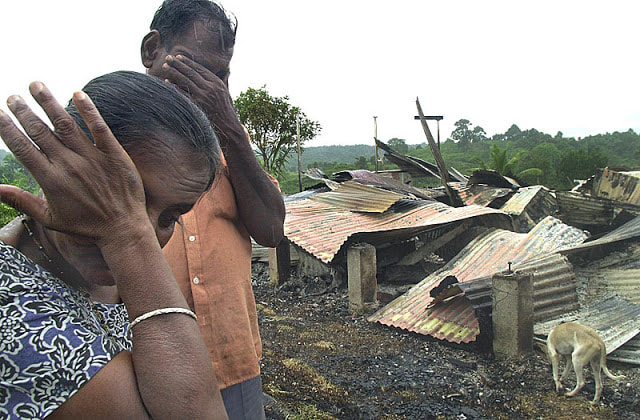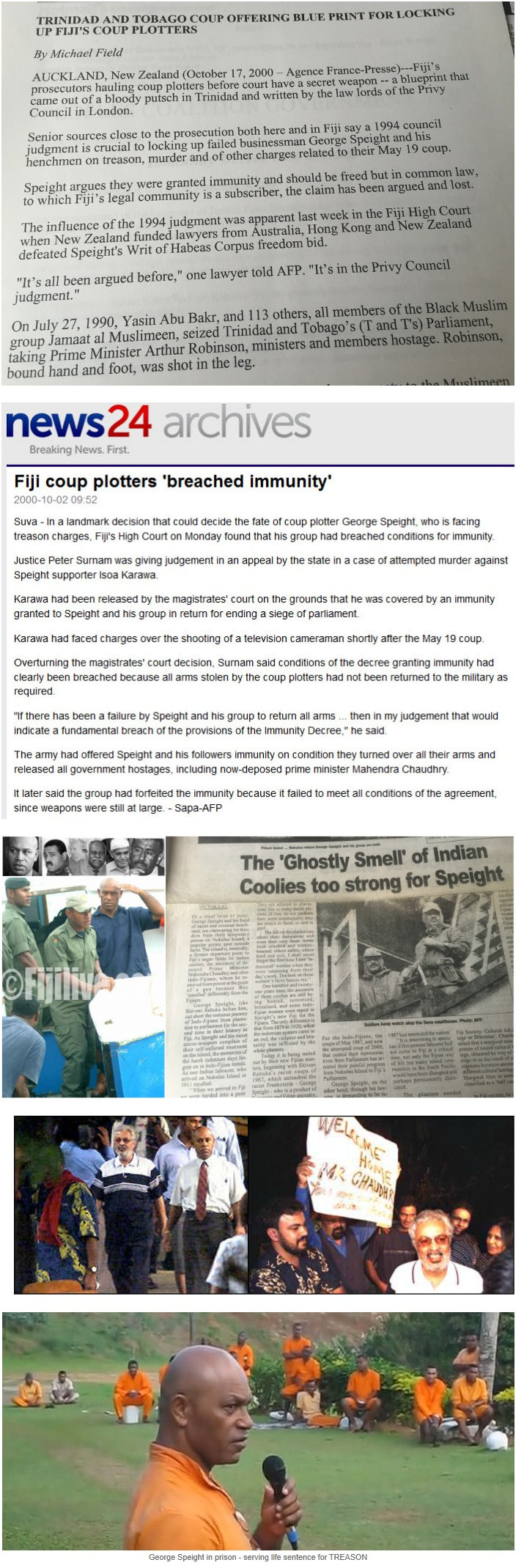Fijileaks: NO, VOTERS, Soon PAP-NFP will FREE GEORGE SPEIGHT
IMMUNITY: The 1987 Coupist, who became a role model for GEORGE SPEIGHT in 2000, is hiding behind Immunity, backed by the NFP.
*Fijileaks: We have always opposed COUPS but under the Doctrine of Necessity the RFMF will be justified to invoke Section 113 (2) of the Constitution of Fiji and overthrow a PAP-NFP girmit government.
*Rabuka has already indicated the Illegal Act he will performing, supported by Prasad, when and if he assumes power in girmit with the NFP after 14 December 2022 - to free George Speight.
*To Indo-Fijian VOTERS: Remember Mohammed Ali Jinnah and the slaughter of over 3million Hindus, Muslims and Sikhs because Jinnah wanted a PAKISTAN for Muslims only, just as PAAPI in 1987 and GEORGE SPEIGHT in 2000 wanted Fiji only for i-Taukei Fijians
| Ratu Naiqama was also sent to prison for the events of 2000. In April 2005, Ratu Naiqama Lalabalavu who was a Minister in the former Qarase led government, and former government senator, Ratu Josefa Dimuri, were released from Labasa Prison to serve their sentences extramurally. Their release came just 11 days after they were sent to prison for eight months for coup related offences. Ratu Naiqama was found guilty of unlawful assembly. Magistrate Sunil Kumar had said at the time that in the 2000 instability, the people of the north expected the chiefs to play a leading role to take them out of the situation. Instead, the chiefs like Ratu Naiqama did otherwise. |
Fijileaks has decided to conceal the identity of the Fiji High Court Judge, 22 August 2000:
LETTER TO EDITOR: FIJI LOOTINGS AND BURNINGS TAILEVU PROVINCE
Submitted by admin on Thu, 07/27/2000 - 00:00LETTER TO THE EDITOR
Wednesday, July 26, 2000
(Fr) John McEvoy Columban Fathers
FIJI LOOTINGS AND BURNINGS TAILEVU PROVINCE
To Whom It May Concern:
The Looting and Burnings in Dawasamu, Waidalice, Namoli and Delasui areas of Tailevu Province - From July 8 to July 20, 2000
The following is an attempt to document some of the atrocities committed against Indian cattle, pig and vegetable farmers in the Namoli, Waidalice, Delasui and Dawasamu areas of Tailevu Province after the take-over of Korovou Town, Tailevu, on Saturday, July 8, 2000, by Speight’s supporters in the area. During the 12 days that followed this takeover, orchestrated crimes were inflicted on a terrified and helpless population living on their isolated farms.
Having documented some cases of looting and break-ins at Muaniweni, Naitasiri, after the May 19 Coup, various groups, religious and others, encouraged me to do similar reports on the Tailevu happenings. We undertook this on Monday, June 24. Earlier attempts of visits were advised against and deemed imprudent. Even on Monday, people in Korovou were not sure if it were safe for us to go to Dawasamu. However, having come thus far the team decided to persevere and travel on.
The team for the day was Radha Krishnan, Eli Daulato, a well-known teacher from the area, Sr. Xavier SOLN and myself.
Dawasamu is reached by traveling northeast form Suva on the Kings Road to Korovou (40 km) on to Natovi on the Lodoni Road (20 km) and on the Dawasamu Road for yet another 15 kilometers.
Anand Singh: We first stopped at the pig and cattle farm of Anand Singh from the Waidalice area about 6 km from the town of Korovou and into the left about 2 km from the main road. Anand, his wife Ishra Devi, daughter Mala - a Form 6 student at Fulton College and a son live here on a very well-run pig and cattle farm of about 213 acres lease land - the lease has expired about a year ago. The family has farmed here for the past 25 years. At the present time they are trying to sell the farm and the stock.
During that week of the Korovou takeover (July 8 - July 20) the Indian families along the main road came to shelter in his house and later on, as reports of looting and stealing got worse and when the rebels put up a road block at the Waidalice bridge on the main road leading towards Korovou, these people moved further into the hills and lived with Fijian families. Anand’s wife and daughter moved to Suva. He hid his vehicles further back from his house as reports came in of farmers who had their twin cabs and other vehicles stolen.
Due to good leadership and the erecting of a roadblock on the road leading to his farm with the help of his Fijian neighbors (all of whom are originally from Motoriki in Ovalau) he protected his two vehicles and perhaps his house. When the rebels took over the place they wanted vehicles for transport and pigs and cattle to feed their gang.
The rebels eventually approached Anand and told him if he gave a pig they would not burn his house. It was his turn to give a pig since a neighboring farmer had given a cow. Anand gave them a pig while another neighbor gave them 2 cows. Isolation was the enemy and because the farms were far apart it was impossible to protect one another. Of course the rebels holding the town of Korovou were also holding both police and soldiers hostage in the police station all during this time. They had taken the soldiers weapons and were patrolling their checkpoints and town with these.
Namoli Settlement: In nearby Namoli settlement 5/6 dairy farmers were attacked and their homes were looted and robbed. One case it was particularly bad -- an elderly couple was attacked from 9:00 pm in the night until 1:00 am in the morning. The woman suffered broken ribs and was badly bruised all over. (I met this couple receiving counseling at the Women’s Crisis Centre in Suva on Friday July 21). Another man whose house was attacked in Namoli has died since.
Although the community here has a burial ground the other side of Korovou town, his family took his body, for safety reasons, to be buried in Suva. We met the funeral procession as we traveled to Korovou on that Monday morning.
Jaswant Singh – Veilolo: Jaswant Singh, his wife, 4 children, mother and his sister Kamlesh, schoolteacher at Natovi Catholic School - living in Veilolo, 5 km further on from Natovi jetty on the Dawasamu Road. Their farm is yet another well run pineapple and vegetable farm. About 40 youths from Lawaki village protected this house from being burned and looted for the 2 weeks duration of the troubles in the area. Indian houses around were either looted or burned. The rebels came and demanded the keys of their truck that the family used to take pineapples to market. However, when they saw the number of the Fijian youth they departed.
In Lawaki Settlement 8/7/2000, Kamlesh Singh reports: The day of the roadblock the whole settlement was gathered together for a wedding. We heard of several looting cases in parts of Tailevu. We also heard that vehicles were being seized. About 2:00 pm, two truckloads of people (mostly outsiders to us) stopped at one of the homes. Inside one of the trucks two policemen were tied and some soldiers also. Some men got off put a knife to an Indian farmer’s throat and demanded the keys to his vehicle. He was threatened that his home would be burned down. They took his pick-up van. After half an hour they did the same at another home and took another pick-up van.
Other farmers once alerted of what was happening hid their vehicles out of sight from the main road. The nearby villagers came in great numbers and stayed with families. Those from Lawaki village stayed in my home and are still here at the present time. Those from Burelevu village stayed with other families. All the women slept in the home where the wedding was supposed to take place for one and a half weeks.
Only one home in Lawaki was looted. It seemed they were just about to set it on fire when the boys looking after our property discovered it and chased them away. This house was broken up, doors and windows were smashed, furniture was wrecked and groceries scattered all over the floor.
On Sunday night 9/7/2000, 3 men came home and asked for our vehicle. The Fijian men who stayed home overnight handled them. They went away, probably scared when they saw the number of men in our house.
The two vehicles that were seized were returned. The boys from Namena village went and demanded the return of the vehicles from Rakiraki. (The Chief of Namena is the Ratu (Chief) of the Tikina (Rakiraki).
In the Nasoni Area: From Veilolo to Dawasamu it is reckoned that some 20 Indian houses in all were looted, ransacked and badly damaged and one completely burnt down.
Houses Burnt
Vinesh Prasad, his wife and their two children (1 and 3 years old), his parents Rajend Prasad and Kesar Mati, his cousin Ritesh, lived here in a nice four bedroom house in Veicorocoro, some 3 km from Veilolo.
The Facts
At about 8.00 pm on Sunday night July 9, 2000 a group of Fijian youth numbering about 20 in all arrived in their church cloths. Some 7 of them entered the house while the remainder stayed outside. They intimidated the family, punched some of the family in the side and held a knife to the neck of Ritesh (cousin). They robbed and ransacked the entire house and took everything they could, money, jewelry, TV and deck electric tools and carpentry tools. Vinesh says that he thinks that this group was from the village of Qelekuro.
Because of this robbery most of the family moved elsewhere. The parents went to Ba. His wife and two children went to Rakiraki. Vinesh himself moved in with a neighboring Fijian family on the opposite side of the road.
On the following Sunday night 16 July, at about 1:00 am, Vinesh and the Fijian family were awakened with the sound of a huge explosion as the house went up in flames and within minutes the entire 4 bedroom house, estimated cost $50,000.00, was gutted and soon lay in a heap of ashes. Even the nearby lemon and mango trees were burned.
When we visited this area at about 3.00 pm on Monday, Vinesh, in his mid-twenties, was working in the nearby field. When he saw us approaching his burnout family house, he came to chat with us and to tell us his story. It was a most emotional meeting between himself and Eli Daulato. She was his teacher at Natovi Catholic School some years ago. They were both wanting for words. As for Vinesh, he said that he was glad that his family was safe.
Bhagat Ram: No. in family 5. This was the first house in Dawasamu to be burnt. This was a very large concrete house with tiled floor. This family has now moved to Suva.
Kenal Dhasi Singh: No. in family 3. House burned. This family has moved to his brother’s house, living in another part of Dawasamu.
Shiu Ram’s very large 6-bedroom house and garage was burned on Thursday night July 13, at about 10:00 pm. His car and three generators were also burned in the inferno. This burning followed the usual pattern used for burning houses in the area. Bottles of petrol was set alight and lobbed through the window, which on impact would explode and quickly cause the fire to spread quickly. A week before this they attacked the house with stones. They poured petrol over two cows and burned them -- they died. They also injured two other cattles by cutting their legs with a cane knife. They then smashed the window screen glass of their two trucks.
One Fijian and five Indian men work for Shiu on his vegetable farm. Since the initial attack they are living with Fijian families. Kamal Prasad, his wife and their daughter Rajnita Wati - a Form 6 student at Queen Victoria School were living in the house the night it was burned. They fled to the nearby village. Rajnita lost everything she needs for school in the fire, cloths, books, uniforms and bags etc. Shiu Ram was in Suva at the time. He is still there but he has returned to have a look a few times. He is shocked at the sight. His wife was in Australia for a daughter’s wedding even before the Coup May 19 took place.
Jadish Prasad - Naivinitavi Settlement: His father and Shiu Ram are bothers. When the thugs arrived at his house they entered and gathered up cloths and set fire to them inside as a threat. Then they demanded $500.00 but Jadish had only $250.00. He gave them this and they departed.
The above is just an effort to highlight a few cases in this area and to show the extent of damage that can be done in a short time to individuals and families by thugs and lawless men. We meet only a few people affected and in pain as a result of the present political situation. We have done this for the benefit of any group or organization -- church or political, national or international -- that may want to know or want to help out in some way.
Thank You.
(Fr) John McEvoy Columban Fathers P.O. Box 2364 Government Buildings Suva, FIJI Tel: 679-308 290 Fax: 679-308 292 Email: [email protected] Mobile: 953800 Nasese, Suva, FIJI ISLANDS
Submitted by admin on Thu, 07/27/2000 - 00:00LETTER TO THE EDITOR
Wednesday, July 26, 2000
(Fr) John McEvoy Columban Fathers
FIJI LOOTINGS AND BURNINGS TAILEVU PROVINCE
To Whom It May Concern:
The Looting and Burnings in Dawasamu, Waidalice, Namoli and Delasui areas of Tailevu Province - From July 8 to July 20, 2000
The following is an attempt to document some of the atrocities committed against Indian cattle, pig and vegetable farmers in the Namoli, Waidalice, Delasui and Dawasamu areas of Tailevu Province after the take-over of Korovou Town, Tailevu, on Saturday, July 8, 2000, by Speight’s supporters in the area. During the 12 days that followed this takeover, orchestrated crimes were inflicted on a terrified and helpless population living on their isolated farms.
Having documented some cases of looting and break-ins at Muaniweni, Naitasiri, after the May 19 Coup, various groups, religious and others, encouraged me to do similar reports on the Tailevu happenings. We undertook this on Monday, June 24. Earlier attempts of visits were advised against and deemed imprudent. Even on Monday, people in Korovou were not sure if it were safe for us to go to Dawasamu. However, having come thus far the team decided to persevere and travel on.
The team for the day was Radha Krishnan, Eli Daulato, a well-known teacher from the area, Sr. Xavier SOLN and myself.
Dawasamu is reached by traveling northeast form Suva on the Kings Road to Korovou (40 km) on to Natovi on the Lodoni Road (20 km) and on the Dawasamu Road for yet another 15 kilometers.
Anand Singh: We first stopped at the pig and cattle farm of Anand Singh from the Waidalice area about 6 km from the town of Korovou and into the left about 2 km from the main road. Anand, his wife Ishra Devi, daughter Mala - a Form 6 student at Fulton College and a son live here on a very well-run pig and cattle farm of about 213 acres lease land - the lease has expired about a year ago. The family has farmed here for the past 25 years. At the present time they are trying to sell the farm and the stock.
During that week of the Korovou takeover (July 8 - July 20) the Indian families along the main road came to shelter in his house and later on, as reports of looting and stealing got worse and when the rebels put up a road block at the Waidalice bridge on the main road leading towards Korovou, these people moved further into the hills and lived with Fijian families. Anand’s wife and daughter moved to Suva. He hid his vehicles further back from his house as reports came in of farmers who had their twin cabs and other vehicles stolen.
Due to good leadership and the erecting of a roadblock on the road leading to his farm with the help of his Fijian neighbors (all of whom are originally from Motoriki in Ovalau) he protected his two vehicles and perhaps his house. When the rebels took over the place they wanted vehicles for transport and pigs and cattle to feed their gang.
The rebels eventually approached Anand and told him if he gave a pig they would not burn his house. It was his turn to give a pig since a neighboring farmer had given a cow. Anand gave them a pig while another neighbor gave them 2 cows. Isolation was the enemy and because the farms were far apart it was impossible to protect one another. Of course the rebels holding the town of Korovou were also holding both police and soldiers hostage in the police station all during this time. They had taken the soldiers weapons and were patrolling their checkpoints and town with these.
Namoli Settlement: In nearby Namoli settlement 5/6 dairy farmers were attacked and their homes were looted and robbed. One case it was particularly bad -- an elderly couple was attacked from 9:00 pm in the night until 1:00 am in the morning. The woman suffered broken ribs and was badly bruised all over. (I met this couple receiving counseling at the Women’s Crisis Centre in Suva on Friday July 21). Another man whose house was attacked in Namoli has died since.
Although the community here has a burial ground the other side of Korovou town, his family took his body, for safety reasons, to be buried in Suva. We met the funeral procession as we traveled to Korovou on that Monday morning.
Jaswant Singh – Veilolo: Jaswant Singh, his wife, 4 children, mother and his sister Kamlesh, schoolteacher at Natovi Catholic School - living in Veilolo, 5 km further on from Natovi jetty on the Dawasamu Road. Their farm is yet another well run pineapple and vegetable farm. About 40 youths from Lawaki village protected this house from being burned and looted for the 2 weeks duration of the troubles in the area. Indian houses around were either looted or burned. The rebels came and demanded the keys of their truck that the family used to take pineapples to market. However, when they saw the number of the Fijian youth they departed.
In Lawaki Settlement 8/7/2000, Kamlesh Singh reports: The day of the roadblock the whole settlement was gathered together for a wedding. We heard of several looting cases in parts of Tailevu. We also heard that vehicles were being seized. About 2:00 pm, two truckloads of people (mostly outsiders to us) stopped at one of the homes. Inside one of the trucks two policemen were tied and some soldiers also. Some men got off put a knife to an Indian farmer’s throat and demanded the keys to his vehicle. He was threatened that his home would be burned down. They took his pick-up van. After half an hour they did the same at another home and took another pick-up van.
Other farmers once alerted of what was happening hid their vehicles out of sight from the main road. The nearby villagers came in great numbers and stayed with families. Those from Lawaki village stayed in my home and are still here at the present time. Those from Burelevu village stayed with other families. All the women slept in the home where the wedding was supposed to take place for one and a half weeks.
Only one home in Lawaki was looted. It seemed they were just about to set it on fire when the boys looking after our property discovered it and chased them away. This house was broken up, doors and windows were smashed, furniture was wrecked and groceries scattered all over the floor.
On Sunday night 9/7/2000, 3 men came home and asked for our vehicle. The Fijian men who stayed home overnight handled them. They went away, probably scared when they saw the number of men in our house.
The two vehicles that were seized were returned. The boys from Namena village went and demanded the return of the vehicles from Rakiraki. (The Chief of Namena is the Ratu (Chief) of the Tikina (Rakiraki).
In the Nasoni Area: From Veilolo to Dawasamu it is reckoned that some 20 Indian houses in all were looted, ransacked and badly damaged and one completely burnt down.
Houses Burnt
Vinesh Prasad, his wife and their two children (1 and 3 years old), his parents Rajend Prasad and Kesar Mati, his cousin Ritesh, lived here in a nice four bedroom house in Veicorocoro, some 3 km from Veilolo.
The Facts
At about 8.00 pm on Sunday night July 9, 2000 a group of Fijian youth numbering about 20 in all arrived in their church cloths. Some 7 of them entered the house while the remainder stayed outside. They intimidated the family, punched some of the family in the side and held a knife to the neck of Ritesh (cousin). They robbed and ransacked the entire house and took everything they could, money, jewelry, TV and deck electric tools and carpentry tools. Vinesh says that he thinks that this group was from the village of Qelekuro.
Because of this robbery most of the family moved elsewhere. The parents went to Ba. His wife and two children went to Rakiraki. Vinesh himself moved in with a neighboring Fijian family on the opposite side of the road.
On the following Sunday night 16 July, at about 1:00 am, Vinesh and the Fijian family were awakened with the sound of a huge explosion as the house went up in flames and within minutes the entire 4 bedroom house, estimated cost $50,000.00, was gutted and soon lay in a heap of ashes. Even the nearby lemon and mango trees were burned.
When we visited this area at about 3.00 pm on Monday, Vinesh, in his mid-twenties, was working in the nearby field. When he saw us approaching his burnout family house, he came to chat with us and to tell us his story. It was a most emotional meeting between himself and Eli Daulato. She was his teacher at Natovi Catholic School some years ago. They were both wanting for words. As for Vinesh, he said that he was glad that his family was safe.
Bhagat Ram: No. in family 5. This was the first house in Dawasamu to be burnt. This was a very large concrete house with tiled floor. This family has now moved to Suva.
Kenal Dhasi Singh: No. in family 3. House burned. This family has moved to his brother’s house, living in another part of Dawasamu.
Shiu Ram’s very large 6-bedroom house and garage was burned on Thursday night July 13, at about 10:00 pm. His car and three generators were also burned in the inferno. This burning followed the usual pattern used for burning houses in the area. Bottles of petrol was set alight and lobbed through the window, which on impact would explode and quickly cause the fire to spread quickly. A week before this they attacked the house with stones. They poured petrol over two cows and burned them -- they died. They also injured two other cattles by cutting their legs with a cane knife. They then smashed the window screen glass of their two trucks.
One Fijian and five Indian men work for Shiu on his vegetable farm. Since the initial attack they are living with Fijian families. Kamal Prasad, his wife and their daughter Rajnita Wati - a Form 6 student at Queen Victoria School were living in the house the night it was burned. They fled to the nearby village. Rajnita lost everything she needs for school in the fire, cloths, books, uniforms and bags etc. Shiu Ram was in Suva at the time. He is still there but he has returned to have a look a few times. He is shocked at the sight. His wife was in Australia for a daughter’s wedding even before the Coup May 19 took place.
Jadish Prasad - Naivinitavi Settlement: His father and Shiu Ram are bothers. When the thugs arrived at his house they entered and gathered up cloths and set fire to them inside as a threat. Then they demanded $500.00 but Jadish had only $250.00. He gave them this and they departed.
The above is just an effort to highlight a few cases in this area and to show the extent of damage that can be done in a short time to individuals and families by thugs and lawless men. We meet only a few people affected and in pain as a result of the present political situation. We have done this for the benefit of any group or organization -- church or political, national or international -- that may want to know or want to help out in some way.
Thank You.
(Fr) John McEvoy Columban Fathers P.O. Box 2364 Government Buildings Suva, FIJI Tel: 679-308 290 Fax: 679-308 292 Email: [email protected] Mobile: 953800 Nasese, Suva, FIJI ISLANDS
Fijileaks: We must be really FEARFUL, coming from the once touted Attorney-General In-Waiting. NFP and Biman Prasad are refusing to comment whether they support PAAPI freeing GEORGE SPEIGHT?
Fijileaks Founding Editor-in-Chief SPEAKS OUT.
He had behind the scene role in putting Speight behind bars
"On 29 May 2000 Bainimarama had abrogated the Constitution, declared martial law, and became leader of the Interim Military Government. In July the military appointed an Interim Fijian Government with Laisenia Qarase as Interim Prime Minister. What about George Speight?
Bainimarama signed the now infamous Muanikau Accord with Speight under which he and his supporters were to release the hostages, surrender their weapons and receive immunity from prosecution. In his defence Bainimarama said he signed the Accord because the crisis had gone on for too long and a peaceful solution was needed. In a cruel twist of irony, Ratu Mara himself was to be removed as President. No sooner Speight was released, he began swaggering around the city with a pistol on display, making a mockery of the Accord.
As I have revealed recently, Mesake Koroi, Daily Post Editor, asked me to analyze the Muanikau Accord (see above). I came to the conclusion that George Speight could be nabbed because of the violation of clause (c) – re the handing of all weapons. The Director of Public Prosecutions Office personnel had been wrongly claiming that the Muanikau Accord was invalid because it was signed under duress. It was not until I published the three part series on the Accord showing why and how Speight could be brought to justice that the army finally, on 26 July 2000, summoned its muscles to nab Speight.
I put forward the 1994 precedent in Trinidad which was later employed by the DPP that saw Speight stripped of immunity and the gang behind bars. Don’t get me wrong, I am not blowing my own trumpet nor that of Koroi. (P.S. I had authorized DPP officers to take an advance copy of my analysis off Koroi at 2am, English time before its publication; in fact, it was none other than the then Interim Prime Minister Laisenia Qarase (a cousin of Koroi) who had taken the copy of my analysis to the military and DPP for consideration. Ratu Ului Mara had captured George Speight."
Bainimarama signed the now infamous Muanikau Accord with Speight under which he and his supporters were to release the hostages, surrender their weapons and receive immunity from prosecution. In his defence Bainimarama said he signed the Accord because the crisis had gone on for too long and a peaceful solution was needed. In a cruel twist of irony, Ratu Mara himself was to be removed as President. No sooner Speight was released, he began swaggering around the city with a pistol on display, making a mockery of the Accord.
As I have revealed recently, Mesake Koroi, Daily Post Editor, asked me to analyze the Muanikau Accord (see above). I came to the conclusion that George Speight could be nabbed because of the violation of clause (c) – re the handing of all weapons. The Director of Public Prosecutions Office personnel had been wrongly claiming that the Muanikau Accord was invalid because it was signed under duress. It was not until I published the three part series on the Accord showing why and how Speight could be brought to justice that the army finally, on 26 July 2000, summoned its muscles to nab Speight.
I put forward the 1994 precedent in Trinidad which was later employed by the DPP that saw Speight stripped of immunity and the gang behind bars. Don’t get me wrong, I am not blowing my own trumpet nor that of Koroi. (P.S. I had authorized DPP officers to take an advance copy of my analysis off Koroi at 2am, English time before its publication; in fact, it was none other than the then Interim Prime Minister Laisenia Qarase (a cousin of Koroi) who had taken the copy of my analysis to the military and DPP for consideration. Ratu Ului Mara had captured George Speight."


